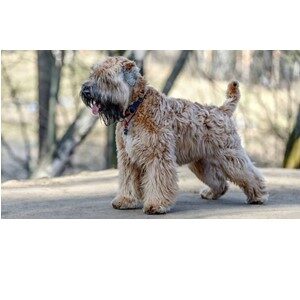Soft Coated Wheaten Terrier Dog Bed
Wheaten Terriers Need A Good Bed!
Introduction
The Soft Coated Wheaten Terrier dog bed take into account their medical condition, sleeping style, and preferences. A memory foam bed is best for their health.
The Wheaten Terrier is a delightful and affectionate breed known for its playful nature, signature wavy coat, and friendly disposition. Originally bred in Ireland as an all-purpose farm dog, Wheatens excelled at herding, guarding livestock, and hunting vermin. Today, they are beloved companion dogs, thriving in active households that can match their energy and enthusiasm.
One of the most endearing traits of the Wheaten is its perpetual puppy-like personality. Unlike many breeds that mellow significantly with age, Wheatens maintain a joyful, exuberant nature well into adulthood.
They are famous for the “Wheaten Greetin”, an enthusiastic and often bouncy welcome that showcases their boundless affection for people. While Wheatens make excellent family pets, they are not the right fit for every household. Their intelligence and high energy levels require consistent training, daily exercise, and mental stimulation.
Additionally, their soft, non-shedding coat requires regular grooming to prevent matting and maintain its signature silky texture. New owners should also be aware of potential health concerns, including protein-losing nephropathy (PLN) and protein-losing enteropathy (PLE), which require careful monitoring of diet and veterinary check-ups.
Their sensitive digestive system means dietary choices are crucial, and feeding them high-quality, well-balanced meals is a priority. For those prepared to meet their needs, the Soft Coated Wheaten Terrier is a loving, loyal, and endlessly entertaining companion.
This guide will provide essential information to help potential owners understand what to expect and how to provide the best possible care for their Wheaten.
Best Dog Bed Types
Here’s a list of the best dog bed types for Soft Coated Wheaten Terriers that you can share with new owners:
- Orthopedic Memory Foam Bed – Ideal for joint support, especially as they age. When buying a memory foam bed, look for the CertiPUR-US Seal.
- Bolster Bed – Provides head and neck support while giving a sense of security.
- Elevated Cooling Bed – Great for airflow, especially in warmer climates.
- Washable Plush Bed – Soft and cozy, perfect for comfort and easy maintenance.
- Crate Mat Bed – Fits inside a crate and offers cushioning for crate-trained dogs.
- Donut Cuddler Bed – Good for dogs that like to curl up while sleeping.
- Waterproof and Durable Bed – Suitable for active dogs and easy cleaning.
Best Brands
Here are some of the best dog bed brands for Soft Coated Wheaten Terrier owners to consider:
- Big Barker – Excellent for orthopedic support, especially for aging or active dogs.
- Furhaven – Offers a variety of styles, including orthopedic and bolster beds.
- PetFusion – Known for its high-quality memory foam beds with durable covers.
- BarksBar – Affordable yet supportive beds with orthopedic padding.
- Kuranda – Great for elevated cooling beds, perfect for warmer climates.
- K&H Pet Products – Offers a range of orthopedic, heated, and cooling beds.
- Majestic Pet – Provides comfortable, plush beds in various sizes.
- Best Friends by Sheri – Popular for donut cuddler beds that provide extra warmth and security.
Facts about the Soft-Coated Wheaten Terrier
Measurements:
- Size: Medium
- Group: Terrier Group
- Height Male: 18 – 19 inches
- Height Female: 17 – 18 inches
- Weight Male: 35 – 40 lbs.
- Weight Female: 30 – 35 lbs.
- Length Male: 26 – 28 inches
- Length Female: 26 – 28 inches
- Lifespan: 12 – 14 years
- Fully Grown: 12 – 18 months
- Colors: Wheaten
- Popularity: This breed is ranked the 69th most popular in the United States by the American Kennel Club for 2023.
- Intelligence: This breed is ranked the 40th most intelligent by Stanley Coren.
Here are some facts about the Soft Coated Wheaten Terrier:
- Irish Origins – The Soft Coated Wheaten Terrier originated in Ireland over 200 years ago and was bred as a versatile farm dog.
- Single Coat – Unlike many terriers, Wheatens have a soft, wavy, and single-layer coat that doesn’t shed much but requires regular grooming.
- Puppy Coat Changes – Wheaten puppies are born darker (often reddish, brown, or even black) and lighten to their signature wheaten color as they mature.
- High Energy – They are an energetic and playful breed that requires daily exercise and mental stimulation.
- Friendly Nature – Wheatens are known for their affectionate and people-friendly personalities, making them great family pets.
- The Wheaten Greetin’ – This breed is famous for its enthusiastic jumping greeting, where they joyfully jump up to say hello.
- Minimal Shedding – While they don’t shed much, their coat requires frequent brushing to prevent matting and tangling.
- Good with Kids – They are generally good with children due to their playful and friendly nature, though supervision is always recommended.
- Moderate Barkers – Wheatens are alert and will bark to notify their owners, but they are not excessive barkers.
- Smart but Stubborn – They are intelligent dogs but can have a stubborn streak, making consistent training important.
- Prone to Protein-Losing Diseases – Wheatens can be prone to genetic health issues like protein-losing enteropathy (PLE) and protein-losing nephropathy (PLN), which affect digestion and kidney function.
- Adaptable Living – They can thrive in both apartments and houses as long as they get enough exercise and attention.
Fun Facts
Here are some fun facts about the Soft Coated Wheaten Terrier that new owners will love:
- Forever Puppies – Wheatens tend to keep their puppy-like energy and playfulness well into adulthood, making them feel like they never grow up!
- The Wheaten Greetin’ – This breed is famous for its signature greeting, where they jump up on people with excitement and joy—sometimes a little too enthusiastically!
- Coat Color Magic – Wheaten puppies are often born dark in color (brown, black, or reddish), but as they grow, their coat gradually lightens to the classic golden wheaten shade.
- Super Soft Fur – Unlike most terriers, who have wiry coats, Wheaten Terriers have a silky, wavy coat that feels more like human hair than dog fur.
- Low Shedding, High Maintenance – While they don’t shed much, their luxurious coats require regular brushing and grooming to keep them from matting.
- They Love to Bounce! – Wheatens are known for their “springy” movement and will often hop or bounce when they’re excited.
- Velcro Dogs – These dogs love their humans and prefer to be close to them at all times, making them perfect for companionship.
- Natural Herding Instincts – Even though they’re terriers, many Wheatens will gently herd kids, other pets, or even their owners around the house.
- Goofy Personalities – Wheatens are full of personality! They love to play, make funny faces, and often act like the class clown of the dog world.
- They Love Water – Unlike many terriers, Wheatens often enjoy swimming and playing in the water, though some are pickier about it.
- Originally a Farm Dog – They were bred to be all-purpose farm dogs in Ireland, helping with hunting vermin, guarding livestock, and herding.
- Therapy Dog Potential – Their affectionate and social nature makes them great candidates for therapy work, especially for visiting hospitals and nursing homes.
Health Conditions
Here’s a list of the most common health conditions that Soft Coated Wheaten Terriers can be prone to:
- Protein-Losing Nephropathy (PLN)
- A genetic kidney disorder that causes protein loss through the urine, leading to kidney failure if untreated.
- Regular vet check-ups and urine protein tests are essential for early detection.
- Protein-Losing Enteropathy (PLE)
- A digestive disorder where the intestines fail to absorb protein properly, leading to weight loss, diarrhea, and swelling.
- Often linked to PLN, so regular monitoring is crucial.
- Addison’s Disease
- A hormonal disorder where the adrenal glands don’t produce enough cortisol, causing weakness, vomiting, and lethargy.
- Can be managed with lifelong medication once diagnosed.
- Renal Dysplasia
- A congenital kidney disease that affects young dogs, leading to kidney failure early in life.
- Responsible breeding practices help reduce the risk.
- Hip Dysplasia
- A common joint issue where the hip joint doesn’t fit properly, causing pain and mobility issues over time.
- Keeping your Wheaten at a healthy weight and providing joint supplements can help manage it.
- Progressive Retinal Atrophy (PRA)
- A genetic eye disorder that leads to gradual vision loss and eventual blindness.
- Responsible breeders test for this condition to prevent it.
- Allergies (Food & Environmental)
- Wheatens are prone to skin allergies and sensitivities to certain foods, pollen, or chemicals.
- Symptoms include itching, ear infections, and digestive issues.
- Ear Infections
- Their floppy ears can trap moisture, making them more susceptible to infections.
- Regular ear cleaning helps prevent issues.
- Hypothyroidism
- A thyroid gland disorder that slows metabolism, leading to weight gain, lethargy, and skin problems.
- Easily managed with daily medication.
- Dental Issues
- Like many small-to-medium breeds, Wheatens can develop tartar buildup and gum disease.
- Regular dental cleanings and brushing can help prevent issues.
- Cancer
- While not as common as PLN or PLE, Wheatens can develop cancers like lymphoma or mast cell tumors later in life.
- Bloat (Gastric Torsion)
- Though not as common in Wheatens as in deep-chested breeds, bloat is still a risk and can be life-threatening if the stomach twists.
- Feeding smaller, more frequent meals and avoiding heavy exercise after eating can help prevent it.
Preventative Care Tip: Regular vet check-ups, genetic testing from responsible breeders, and a proper diet can help minimize many of these risks.
Behavior Issues
Here’s a list of behaviors that new owners should know about the Soft Coated Wheaten Terrier:
- The Wheaten Greetin’
- Wheatens are famous for their enthusiastic jumping greeting when they meet people. While adorable, this behavior should be trained early to prevent excessive jumping.
- Playful & Puppy-Like Energy
- Even as adults, Wheatens retain their puppy-like playfulness and energy, making them fun but sometimes a handful.
- High Prey Drive
- They were originally bred to hunt vermin, so they may chase small animals like squirrels, rabbits, and even cats. Secure fencing is a must!
- Stubborn but Smart
- Wheatens are intelligent but have an independent streak, meaning training requires patience and consistency. Positive reinforcement works best.
- Velcro Dog Mentality
- They are very people-oriented and love being close to their owners. Separation anxiety can be an issue if left alone too long.
- Barking Alert Dog
- Wheatens are not excessive barkers, but they will alert their owners to strangers or unusual noises.
- Digging Instincts
- Like many terriers, they love to dig, so be prepared if you have a garden! Providing a designated digging spot can help redirect this habit.
- Mouthy & Nippy as Puppies
- Wheaten puppies tend to be mouthy, using their mouths to play. Proper training and chew toys can help curb this behavior.
- Moderate Energy Needs
- Wheatens need daily exercise (walks, playtime, or training sessions) to stay happy and well-behaved. Without it, they may become destructive.
- They Love Water (Sometimes)
- Some Wheatens enjoy swimming, while others prefer to stay dry. Introduce them to water early to see if they like it.
- Sensitive to Harsh Training
- They respond poorly to harsh corrections and need positive, reward-based training to thrive.
- Mischievous & Clownish
- Wheatens love to entertain and will often do silly things to get attention. Expect goofy behavior and a fun-loving personality!
- Good with Kids but Needs Training
- They can be great family dogs, but their energy and jumping may be overwhelming for small children. Supervision and training are key.
- Escape Artists
- If bored, some Wheatens may find ways to escape by digging under fences or squeezing through gaps. Secure fencing is essential.
- Food Motivated
- They love food and may try to steal snacks. Keep food out of reach and use treats for training motivation.
- Slow to Mature
- Wheatens stay playful and puppy-like longer than some breeds, often not maturing fully until they’re 3–4 years old.
- Can Be Dog-Selective
- While friendly, some Wheatens can be bossy with other dogs, especially if not properly socialized early.
- Easily Excited
- They get excited quickly, which can lead to jumping, zoomies, or excessive enthusiasm when meeting new people.
New owners should be prepared for a playful, affectionate, and sometimes stubborn companion that thrives on human interaction and consistent training.
Tips for New Owners
Here’s a list of tips for Soft Coated Wheaten Terrier owners:
General Care & Lifestyle
- Expect a Playful, Energetic Dog – Wheatens have a puppy-like personality well into adulthood and need daily exercise to stay happy.
- Be Ready for the “Wheaten Greetin’” – This breed is famous for jumping on people when excited. Start training early to manage this behavior.
- A Velcro Dog – Wheatens love being around their owners and don’t like being left alone for long periods. They can develop separation anxiety.
- Secure Your Yard – They are escape artists who may dig under fences or squeeze through gaps, so a secure yard is a must.
Training & Socialization
- Start Training Early – Wheatens are smart but stubborn. Use positive reinforcement and be consistent with training.
- Socialization is Key – Expose your Wheaten to different people, pets, and environments early to prevent shyness or dog-selective behavior.
- Prevent Excessive Barking – While not big barkers, they will alert you to anything unusual. Teach a “quiet” command to manage their barking.
- Manage Their Prey Drive – Wheatens may chase small animals, so leash training and strong recall commands are important.
Grooming & Coat Care
- Brush Often to Avoid Matting – Their soft, wavy coat needs brushing several times a week to prevent tangles and mats.
- Schedule Regular Grooming – Wheatens need professional grooming every 6–8 weeks to keep their coat healthy and manageable.
- Ear Cleaning is Essential – Their floppy ears can trap moisture, leading to ear infections, so clean them regularly.
- Minimal Shedding, But Not Low Maintenance – While they don’t shed much, they require high-maintenance grooming.
Health & Nutrition
- Feed a High-Quality Diet – Wheatens are prone to food allergies and protein-losing diseases (PLN/PLE), so monitor their diet carefully.
- Watch for Common Health Issues – Stay aware of conditions like hip dysplasia, Addison’s disease, and kidney disorders.
- Regular Vet Check-Ups – Since they are prone to protein-losing nephropathy (PLN) and enteropathy (PLE), regular bloodwork and urine tests can catch issues early.
Exercise & Mental Stimulation
- Daily Walks & Playtime are a Must – A bored Wheaten can be destructive, so make sure they get enough physical and mental exercise.
- They Love Interactive Toys & Puzzle Games – Mental stimulation is just as important as physical exercise for this intelligent breed.
- Great for Agility & Obedience Training – Wheatens do well in agility, rally, and trick training, which keeps their minds and bodies active.
Living with a Wheaten
- They Stay Puppy-Like for Years – Wheatens mature slowly, often acting like puppies until they’re 3–4 years old.
- Expect a Goofy, Loving Companion – They have a silly, clownish personality and will find ways to make you laugh daily.
- Not the Best Guard Dog – While they will alert you to strangers, they are friendly and not aggressive, making them better watchdogs than guard dogs.
- Great for Active Families – Wheatens thrive in homes that enjoy outdoor activities, playtime, and interactive training.
Costs of Ownership
Here’s a breakdown of the average costs of owning a Soft Coated Wheaten Terrier: Initial Costs
- Puppy Price: $1,500 – $3,500
- Prices vary based on breeder reputation, location, and lineage.
- Adoption fees (if adopting) typically range from $200 – $500.
- Initial Veterinary Exam & Vaccinations: $100 – $300
- First shots, deworming, and a health check-up.
- Spay/Neuter: $200 – $500
- Costs vary by location and veterinary clinic.
- Microchipping: $25 – $50
- Provides permanent identification in case your dog gets lost.
- Basic Supplies: $200 – $500
- Bed, crate, leash, collar, harness, food/water bowls, toys, and grooming tools.
- Initial Training Classes: $150 – $300
- Puppy obedience or socialization classes are highly recommended.
Recurring Annual Costs
- Food: $500 – $1,000 per year
- Wheatens thrive on high-quality food, which costs around $40 – $80 per month.
- If they have food allergies, specialty diets can be $100+ per month.
- Grooming: $500 – $1,000 per year
- Professional grooming every 6–8 weeks costs about $60 – $100 per session.
- DIY grooming can reduce costs, but quality clippers and tools may cost $100 – $200 upfront.
- Routine Vet Visits: $300 – $600 per year
- Annual check-ups, vaccinations, and preventative care.
- Flea, Tick & Heartworm Prevention: $200 – $400 per year
- Monthly medications to keep them healthy.
- Pet Insurance (Optional): $300 – $600 per year
- Helps cover accidents, illnesses, and genetic conditions.
- Training & Socialization: $200 – $500 per year
- Group training classes or private lessons if needed.
- Toys & Enrichment: $100 – $300 per year
- Wheatens love toys! Durable chew toys, puzzle games, and interactive play items add up over time.
Other Potential Costs
- Emergency Vet Visits: $500 – $3,000+ per incident
- Unexpected health issues like allergies, injuries, or digestive problems can arise.
- Having an emergency fund or pet insurance can help with unexpected expenses.
- Dog Walking or Pet Sitting: $15 – $40 per session
- If you work long hours or travel frequently, hiring a dog walker or pet sitter adds to the cost.
- Boarding or Pet Sitting: $30 – $75 per night
- If you travel, boarding costs can add up quickly.
Estimated First-Year Costs: $3,000 – $6,000
- Includes adoption/purchase, initial vet visits, training, grooming, and supplies.
Estimated Annual Costs After First Year: $1,500 – $3,500
- Costs vary based on grooming frequency, food quality, and health expenses.
Lifetime Cost Estimate (12–15 years): $20,000 – $45,000+
- Owning a Wheaten is a long-term commitment, both financially and emotionally!
Safe Foods and Foods to Avoid
Here’s a list of safe foods and foods to avoid for a Soft Coated Wheaten Terrier, especially considering their tendency for food sensitivities and protein-losing diseases (PLN & PLE).
Safe Foods for Wheatens
These foods are generally safe and healthy when fed in moderation:
Proteins (Cooked, Boneless, & Unseasoned)
- Lean meats – Chicken, turkey, beef, lamb
- Fish – Salmon, sardines (rich in omega-3s)
- Eggs – A good source of protein and vitamins
- Plain, cooked lentils – A plant-based protein option
Vegetables (Cooked or Raw, Finely Chopped)
- Carrots – Great for dental health
- Green beans – Low-calorie and fiber-rich
- Sweet potatoes – Good for digestion, best cooked
- Pumpkin (plain, canned or fresh) – Aids digestion
- Zucchini – Hydrating and nutrient-rich
- Spinach (in small amounts) – Contains iron and antioxidants
Fruits (In Small Amounts)
- Apples (without seeds) – High in fiber and vitamins
- Bananas – Great for energy, but high in sugar
- Blueberries – Packed with antioxidants
- Strawberries – Vitamin C-rich
- Watermelon (seedless, no rind) – Hydrating and refreshing
Grains & Carbs (For Dogs Without Grain Sensitivities)
- Brown rice – Easily digestible and good for energy
- Quinoa – A protein-rich alternative to grains
- Oatmeal – Gentle on the stomach and full of fiber
Dairy (If Tolerated in Small Amounts)
- Plain yogurt (unsweetened, no artificial sweeteners) – Good for probiotics
- Cottage cheese (low-fat, unseasoned) – A calcium and protein source
Healthy Treats & Oils
- Peanut butter (xylitol-free, unsalted) – A favorite treat
- Coconut oil (in moderation) – Supports skin and coat health
- Plain popcorn (unsalted, unbuttered) – A light, crunchy snack
Foods to Avoid for Wheatens
These foods can be toxic or harmful, especially for a breed prone to food sensitivities:
Toxic Foods (NEVER Feed)
- Chocolate & Caffeine – Contains theobromine, toxic to dogs
- Grapes & Raisins – Can cause kidney failure
- Onions, Garlic, & Chives – Can damage red blood cells
- Xylitol (Artificial Sweetener) – Found in gum, candy, and some peanut butters; causes dangerous blood sugar drops
- Macadamia Nuts – Toxic and can cause weakness, vomiting, and tremors
High-Risk Foods (Avoid Due to Health Concerns)
- Avocados – Contains persin, which may cause digestive upset
- Raw Dough (Yeast Dough) – Can expand in the stomach and cause serious issues
- Fatty or Fried Foods – Can lead to pancreatitis
- High-Salt Foods (Chips, Deli Meats, etc.) – Can cause excessive thirst and sodium poisoning
- Raw Pork or Fish – May contain parasites and bacteria
- Dairy (in excess) – Many Wheatens are lactose intolerant
Problematic for Dogs Prone to Allergies or Digestive Issues
- Corn & Wheat – Common allergens for dogs with sensitive stomachs
- Soy Products – Can cause food intolerance reactions
- Excessive Dairy (Milk, Cheese, Ice Cream) – Can cause digestive upset
- Too Many Treats – Even healthy treats should only make up 10% of a dog’s diet
Additional Feeding Tips for New Owners:
- Stick to a High-Quality, Limited-Ingredient Diet – Helps prevent allergies and digestive issues.
- Introduce New Foods Slowly – Monitor for signs of allergies (itching, diarrhea, or vomiting).
- Avoid Table Scraps – Many human foods contain unsafe seasonings, fats, or additives.
- Portion Control is Key – Overfeeding can lead to weight gain and worsen health issues.
- Check Labels for Hidden Ingredients – Some packaged foods contain onion powder, xylitol, or artificial additives that are harmful.
Conclusion
Owning a Soft Coated Wheaten Terrier is a rewarding experience, but it comes with responsibilities that potential owners must be prepared for. This playful, affectionate, and energetic breed thrives in a home where they are given plenty of attention, regular exercise, and consistent training.
Their puppy-like enthusiasm, combined with their intelligent yet stubborn nature, makes them both charming and occasionally challenging to raise. One of the most important aspects of Wheaten care is grooming. While their low-shedding coat makes them a great option for allergy-sensitive owners, it requires frequent brushing and professional grooming to prevent matting and maintain its soft, wavy texture. Failing to keep up with their grooming needs can lead to painful tangles and skin issues.
Additionally, proper training and socialization are key to raising a well-behaved Wheaten. Their natural exuberance, including the famous “Wheaten Greeting,” can be overwhelming for some people. Teaching them good manners early on—such as not jumping on guests—will help ensure they remain well-mannered companions.
From a health perspective, regular veterinary check-ups and a well-balanced diet are crucial. Wheatens are prone to genetic conditions like PLN, PLE, and Addison’s disease, which require careful monitoring. Feeding them high-quality food and avoiding common allergens can help minimize health risks.
Financially, owning a Wheaten is a long-term commitment, with costs ranging from grooming and vet care to training and high-quality food. While they are not the most expensive breed to own, their maintenance needs are higher than some first-time owners expect.
Despite these challenges, the Soft Coated Wheaten Terrier is an incredibly loving and devoted companion. They form strong bonds with their families, bringing joy, laughter, and energy into their homes.
For those willing to invest the time, effort, and care required to meet their needs, Wheatens will reward their owners with unwavering loyalty, endless affection, and a lifetime of happy memories. If you are looking for a friendly, active, and playful dog that will keep you on your toes while showering you with love the Soft Coated Wheaten Terrier may just be the perfect breed for you!
Shop Dog Beds
Shop dog beds for your dog by selecting or clicking on any bed of choice. You will be taken to Amazon where you can read customer reviews and answered questions and place the order.
As an Amazon Associate, I earn from qualifying purchases.
Your purchase price is the same as if you shop directly on Amazon. The price at time of publish is included below to give you an idea of what the price is; however, it is subject to change.
Shop Rectangle Dog Beds
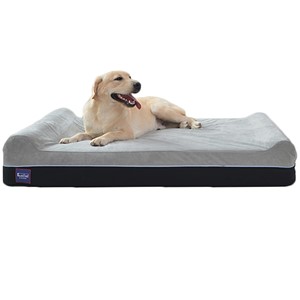
Laifug Large Grey Orthopedic Rectangle Bed
Price At Time of Publish $130.00
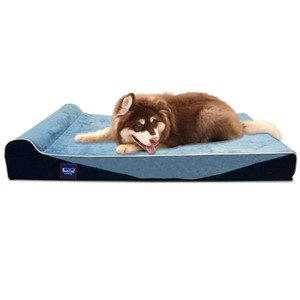
Laifug Large Blue Orthopedic Rectangle Bed
Price At Time of Publish $130.00 $110.00
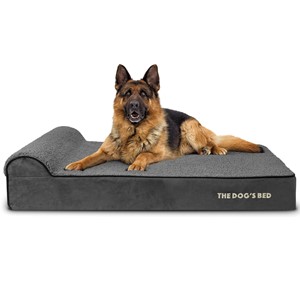
The Dogs Bed XL Grey Orthopedic Rectangle Bed
Price At Time of Publish $130.00 $185.00
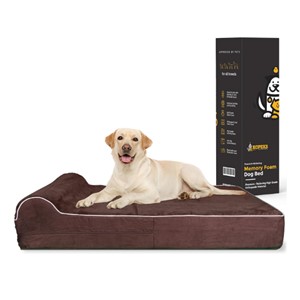
KOPEKS Jumbo Orthopedic Rectangular Bed
Price At Time of Publish $130.00 $110.00
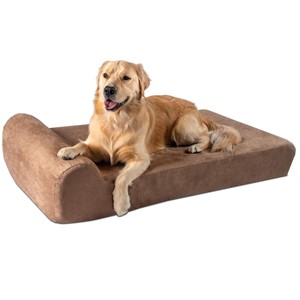
Big Barker XL Orthopedic Rectangle Bed
Price At Time of Publish $130.00 $240.00
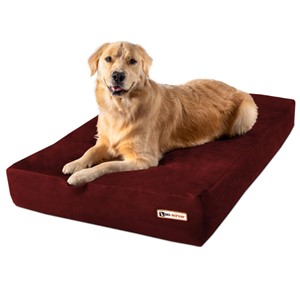
Big Barker XL Burgundy Orthopedic Rectangle Bed
Price At Time of Publish $130.00 $200.00
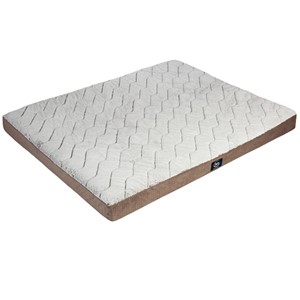
Serta XL Brown Orthopedic Rectangle Bed
Price At Time of Publish $130.00 $80.00
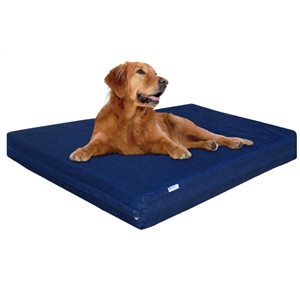
DogBed4Less XL Blue Orthopedic Rectangle Bed
Price At Time of Publish $130.00 $80.00
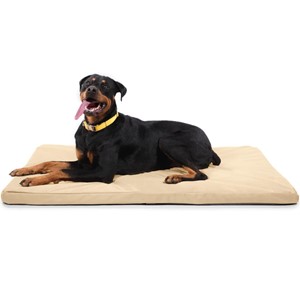
K9 Ballistics XL Sandstone Orthopedic Crate Pad
Price At Time of Publish $130.00 $159.00
Shop Bolster Dog Beds
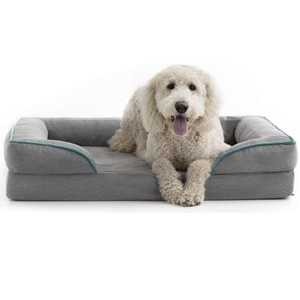
Brindle XL Gray Orthopedic Bolster Bed
Price At Time of Publish $130.00 $79.00
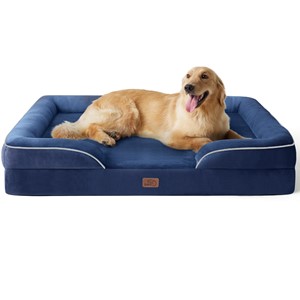
Bedsure XL Blue Orthopedic Bolster Bed
Price At Time of Publish $130.00 $76.00
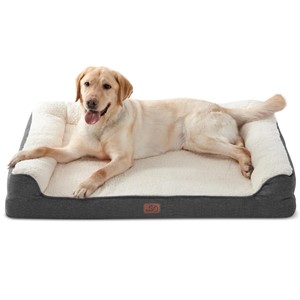
Bedsure XL Grey Orthopedic Bolster Bed
Price At Time of Publish $130.00 $60.00
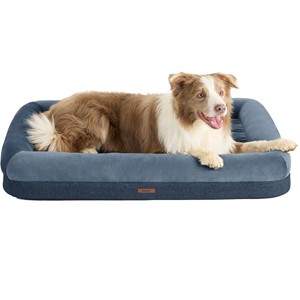
Lesure XL Navy Orthopedic Bolster Bed
Price At Time of Publish $130.00 $40.00
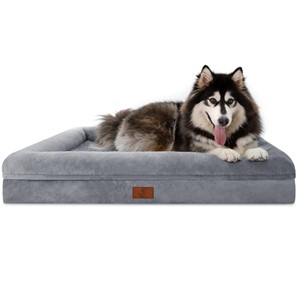
Yiruka XL Grey Orthopedic Bolster Bed
Price At Time of Publish $130.00 $55.00
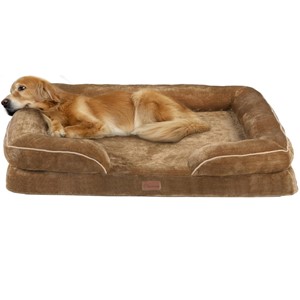
Yitahome XL Brown Orthopedic Bolster Bed
Price At Time of Publish $130.00 $37.00
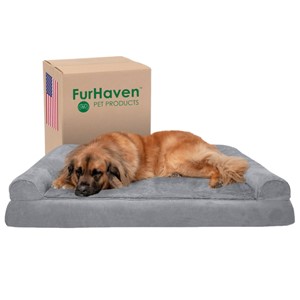
Furhaven XL Gray Orthopedic Bolster Bed
Price At Time of Publish $130.00 $130.00
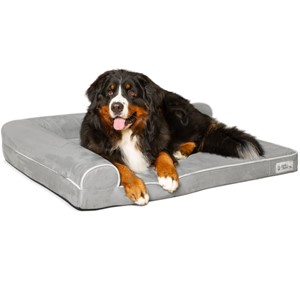
PetFusion XL Grey Orthopedic Bolster Bed
Price At Time of Publish $130.00 $60.00
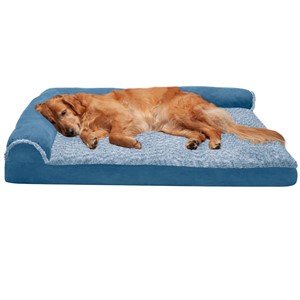
Furhaven Jumbo Blue Orthopedic Bolster Bed
Price At Time of Publish $130.00 $60.00
Shop Elevated Dog Beds
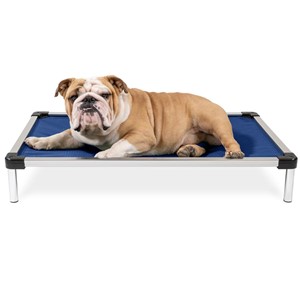
K9 Ballistics Chew Proof Elevated Small Bed
Price At Time of Publish $130.00 $129.00
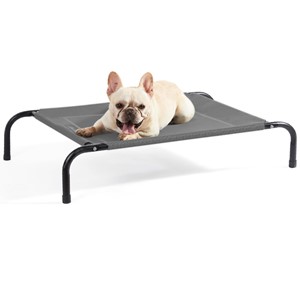
Bedsure Medium Elevated Dog Bed
Price At Time of Publish $130.00 $33.00
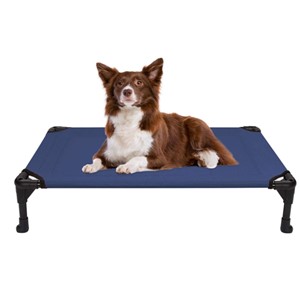
Veehoo Medium Elevated Dog Bed
Price At Time of Publish $130.00 $45.00
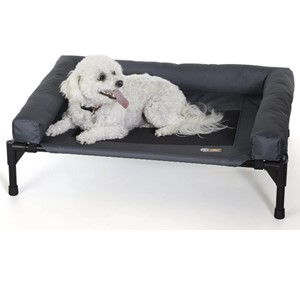
K&H Pet Products Elevated Bolster Dog Bed
Price At Time of Publish $130.00 $57.00
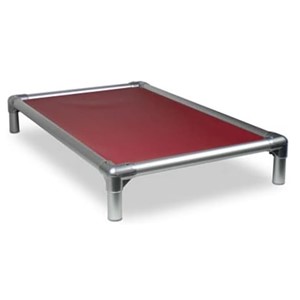
Kuranda Elevated Chew Proof Small Dog Bed
Price At Time of Publish $130.00 $134.00
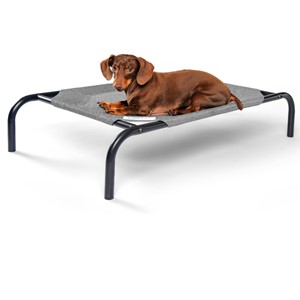
Coolaroo Small Elevated Dog Bed
Price At Time of Publish $130.00 $21.00
Related Articles
Below are some other articles you may be interested in reading. Just select on the topic of interest to learn more about it.
- Best Healthy Dog Food Brands
- Christmas Presents for My Dog
- Crates for Dogs
- Critical Signs Your Dog Needs Help
- Dog Training Techniques
- How To Train a Puppy
- Positive Reinforcement for Dog Training
- Puppy Proofing Your House
- All Dog Breed Rankings
- Training Dog with Treats
- Using Alexa for Dog Behaviors
Go back to the Dog Luxury Beds home page.
